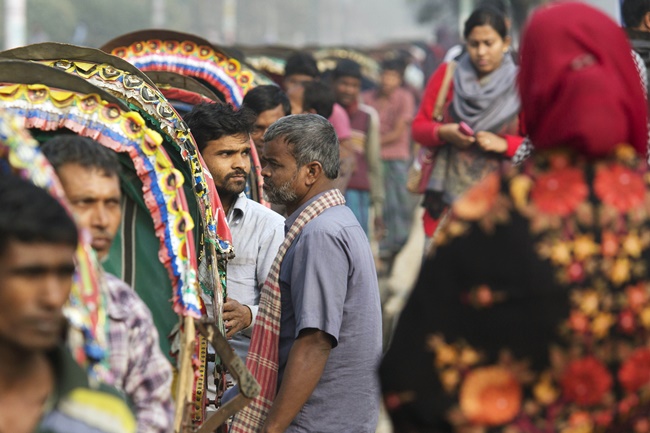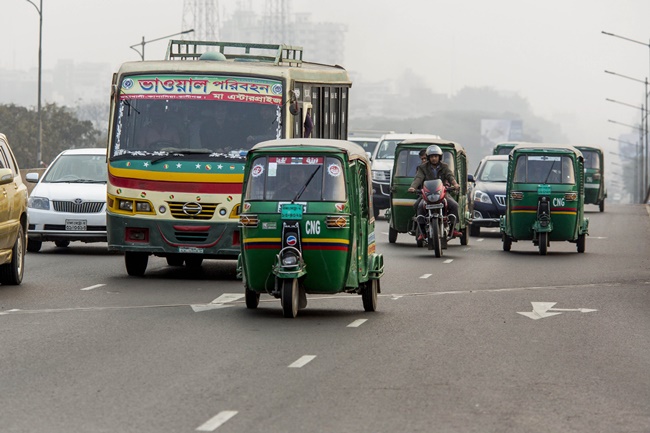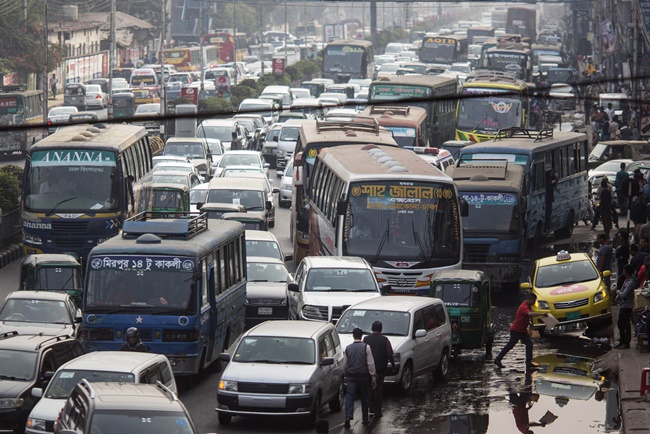
When Islamic State militants first attacked a foreigner in Bangladesh last September, long-time expatriate Samantha Morshed brushed it off even though she heard the gunshots from her bedroom in Dhaka's diplomatic enclave.
Morshed, 48, figured the murder of an Italian aid worker was a random act of violence in the capital of a Muslim-majority nation with almost three times as many people as her native Britain. She had lived in Dhaka with her Bangladeshi husband for more than a decade, and employs more than 2,000 local women who hand-knit children's toys and hats for her non-profit company.
On July 1, everything changed. Islamic State-linked militants killed 17 foreigners and five Bangladeshis after an 11-hour siege at the Holey Artisan Bakery, just a short walk from Morshed's house. She's now in Bangkok and wary about returning later this month.
"I know a number of people who left this time," Morshed said from Bangkok. "Many of them are not coming back."
Morshed is among a growing number of expatriates either leaving Bangladesh, canceling travel plans or shutting down local events out of fear they might be targeted by Islamic militants. The prospect of more attacks on foreigners threatens to cause long-term economic damage, particularly to the $28 billion garment industry that accounts for 80 percent of exports.
So far, Bangladesh's economy has held up well as global demand stays sluggish. The outlook for the fiscal year through June 2017 has brightened, with economists in a Bloomberg survey last month raising growth forecasts to 6.75 percent, one of the highest among emerging markets.
Yet the attacks targeting foreigners are suddenly making Bangladesh a scary place to do business. Those killed in the cafe included Italians working in the garment sector and Japanese aid workers, similar to many of the professions held by those in Bangladesh's small expatriate community.

In the past few weeks, Prime Minister Sheikh Hasina's government has arrested key members of local militant group Jamaat-ul-Mujahideen Bangladesh, which it blames for the attacks. It has downplayed the links with the Islamic State, which claimed responsibility and released photos of the victims.
"The government doesn't want to say it has a terrorism problem, because that could hurt investment and trade with other countries," said Sajjan Gohel, who teaches at the London School of Economics. "But not tackling it is going to hurt its economy in the long term."
Home Minister Asaduzzaman Khan rejected assertions that Bangladesh isn't doing enough to stem terrorism. The government is providing police protection to executives of foreign garment retailers, escorting them from airport to hotels to factories, he said. It is also seeking help from other nations.
"We have deployed adequate security forces in the diplomatic area where embassies are located and foreigners live," Khan said by phone. "Intelligence agents are working round the clock."
Since the gruesome assault, Dhaka's upscale Gulshan area looks like a neighborhood at war. Police have set up more checkpoints and put more plainclothes officers on the streets. Hotels have tightened security. Restaurants are almost empty despite deploying extra security guards. Unimart, the largest supermarket in Gulshan with a popular coffee shop, is almost totally devoid of foreigners.
The British Council, a U.K. government organization that promotes educational opportunities and cultural relations, said on July 27 it was shutting its Bangladesh office until it could put in place new security measures. The U.S. embassy in Dhaka has said it will pay for diplomats to send families home, putting pressure on other embassies and major international organizations to do the same.
Experts say the concerns are warranted. A week after the cafe massacre, five Islamists killed three and injured 14 people at an Eid celebration in central Bangladesh. On July 26, a police raid killed nine Islamic militants who authorities say were preparing a major attack. One of those killed was a Bangladeshi-American MBA student, highlighting the growing appeal of militancy among even the Dhaka elite.
"Further high-profile attacks on foreigners throughout the country are likely, whether direct attacks or mass-casualty attacks on 'soft' targets, especially given difficulties in preventing such attacks," said Romita Das, a South Asia analyst at Control Risks, a risk consultancy that is advising clients to avoid travel to Bangladesh if possible.

Many international clothing chains maintain staff in Dhaka to oversee purchasing and orders from local factories. But companies are becoming wary of having foreigners in Dhaka. Fast Retailing Co., the Japanese company that owns the Uniqlo clothing brand, banned non-crucial travel to Bangladesh, the BBC reported. The company didn't respond to an e-mail seeking comment.
Fazlul Hoque, whose Plummy Fashions factory exports $30 million worth of knitwear annually, said he recently had to fly to Hong Kong to meet two buyers who refused to fly in and meet him at his facility outside Dhaka.
"It seems the buyers are not in a mood to visit Bangladesh at this moment," he said. "If more attacks strike Bangladesh, that may slow export growth."
Although Hoque sees little near-term impact to his company, which churns out one million garments a month mainly to Europe, he does worry about the economic impact if the attacks continue, or worsen -- which many analysts think is likely.
Bangladesh has seen a dramatic increase in violent Islamist attacks, in part due to political infighting between Hasina and the opposition leader Khaleda Zia, who boycotted the last election in 2014 and faces charges for corruption and inciting violence. Zia's husband, the country's first military ruler, started the Bangladesh Nationalist Party, or BNP, which has called itself the "Islamic consciousness" of the Muslim majority.
Local groups have since targeted secular bloggers and other political targets in low-tech attacks, often using machetes. In April, Hasina blamed the BNP for the murder of a gay rights activist, an allegation the party called "totally ridiculous."
The recent violence is also causing alarm in neighboring India. Rising Islamist militancy threatens to spill across the porous border into the Indian state of West Bengal, according to Neelam Deo, a former Indian ambassador and director of the Gateway House policy research group in Mumbai.
"It's a fake border," she said. "There are no natural features there. It cuts through people's fields, through villages."
Morshed, the U.K. expatriate who went to Bangkok after the massacre, has delegated the day-to-day operations of her social enterprise to a local executive director. She plans to liaise with wholesalers and distributors from Bangkok, where she has put her kids in boarding school.
On her next trip to Dhaka, she said that she'll probably stay indoors the entire time due to the fear that foreigners are under attack.
